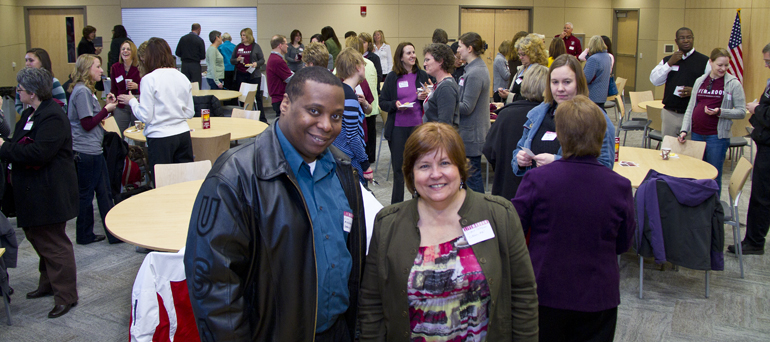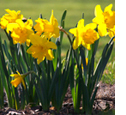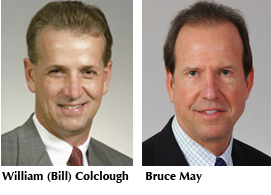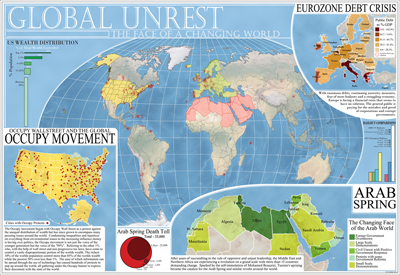Posted 10:37 p.m. Friday, March 9, 2012

This week's news.
UW-L’s Centennial Hall earns state award
UW-L’s new academic building, Centennial Hall, is popular and highly utilized by students and staff — it’s also award-winning.Mind over batter: UW-L professor emeritus sets mindset for baseball, more
When Yogi Berra said, “Baseball is 90 percent mental; the other 50 percent is physical,” he was right — about the mental part.
Faculty, staff mingle at LIVE MAROON kickoff event
[caption id="attachment_10445" align="alignnone" width="770" caption="Linc Middlebrook, Student Affairs, and Ingrid Peterson, Violence Prevention, were among the more than 100 faculty and staff taking a short break to LIVE MAROON Thursday, March 8. The morning event in the Cameron Hall of Nations, Centennial Hall, featured treats and conversation, along with a get-to-know-you game that awarded LIVE MAROON T-shirts to winners. Faculty and staff had an opportunity to meet and talk with others from across campus. With the Morale Retreat set for April 11, the second LIVE MAROON Get-Together will be planned in May. The event is sponsored by Campus Climate, University Communications and University Police. "] [/caption]
[/caption]

Spring break continues through March 18
UW-L’s spring break runs through Sunday, March 18. Classes resume Monday, March 19. Although classes do not meet during spring break, most offices on campus remain open for business as usual.Animal bones tell the story of an ancient culture
[caption id="attachment_10378" align="alignright" width="134" caption="Jonathan Baker"] [/caption]
[/caption]
UW-L professor shares research from Gulf Coast site
Animal bones found along the coast of the Gulf of Mexico tell the story of how an ancient human culture survived between 200 B.C. and 1,000 A.D. Jonathan Baker, UW-L assistant professor of archaeology, will share his research on these ancient coast dwellers during a lecture at 7 p.m. Thursday, April 5, in Port O' Call in UW-L’s Cartwright Center. Baker is a 2003 UW-L alumnus and graduate of UW-L's Archaeological Studies Program. Baker collected more than 60,000 animal bones from two sites near Mobile Bay, Ala., while working toward his doctorate degree in anthropology — which he’ll complete this spring — from the University of Tennessee. “Usually animal bones are poorly preserved in this area,” he says. “When the large quantity of remains was excavated, it was immediately recognized to have the potential to answer a number of questions regarding ancient human adaptations on the Gulf Coast.” The bones are the remains from meals humans ate along the coast about 1,000 years ago. They give Baker and other archaeologists clues about how people adapted to an aquatic environment, their diet and economic patterns. Other remains along the coast help archaeologists understand the different types of fishing practices people used and what time(s) of the year people occupied the sites. They also aid in the reconstruction of ancient environments and climates. If you go— Who: Jonathan Baker, assistant professor of archaeology What: Presentation on ancient Gulf Coast population Where: Port O' Call, Cartwright Center-Gunning Addition When: 7 p.m. Thursday, April 5 Admission: FreeCBA Dean Colclough returns to faculty position; May appointed CBA dean
 College of Business Administration Dean William (Bill) Colclough will return to a faculty position in the Department of Finance effective June 29.
Colclough joined the UW-L faculty in 1980 and has been a professor in the Finance Department since 1990. He has served as CBA's dean since 2000. He was the interim provost in 2007-08 and vice president for Administration Finance in 2006-07.
UW-L Professor Bruce May has been appointed dean of the College of Business Administration from July 2012 until the 2014-15 academic year. A national search for a CBA dean will occur during the 2014-15 academic year. May previously served as CBA's interim dean for two years and associate dean for eight years.
The appointment as dean, rather than interim dean, will facilitate maintaining and developing the college's international, business, donor and alumni relationships, as well as provide stable leadership during the college's Association to Advance Collegiate Schools of Business accreditation visit, academic program review and the university's Higher Learning Commission (HLC) accreditation visit.
College of Business Administration Dean William (Bill) Colclough will return to a faculty position in the Department of Finance effective June 29.
Colclough joined the UW-L faculty in 1980 and has been a professor in the Finance Department since 1990. He has served as CBA's dean since 2000. He was the interim provost in 2007-08 and vice president for Administration Finance in 2006-07.
UW-L Professor Bruce May has been appointed dean of the College of Business Administration from July 2012 until the 2014-15 academic year. A national search for a CBA dean will occur during the 2014-15 academic year. May previously served as CBA's interim dean for two years and associate dean for eight years.
The appointment as dean, rather than interim dean, will facilitate maintaining and developing the college's international, business, donor and alumni relationships, as well as provide stable leadership during the college's Association to Advance Collegiate Schools of Business accreditation visit, academic program review and the university's Higher Learning Commission (HLC) accreditation visit.
 Jeff C. Bryan, Chemistry, presented "Depleted Uranium" to local sections of the American Chemical Society in Wisconsin Rapids on Feb. 13, UW-Oshkosh on Feb. 14 and Milwaukee on Feb. 15. He also presented “Nuclear Science and Fiction in Star Trek” to the Minnesota American Chemical Society at Macalester College in St. Paul on Feb. 23.
Sharon Jessee, English, presented "Toni Morrison's 'The Bluest Eye': Aesthetics, Narration, and the Law "at Middle Tennessee State University March 1.
Jeff C. Bryan, Chemistry, presented "Depleted Uranium" to local sections of the American Chemical Society in Wisconsin Rapids on Feb. 13, UW-Oshkosh on Feb. 14 and Milwaukee on Feb. 15. He also presented “Nuclear Science and Fiction in Star Trek” to the Minnesota American Chemical Society at Macalester College in St. Paul on Feb. 23.
Sharon Jessee, English, presented "Toni Morrison's 'The Bluest Eye': Aesthetics, Narration, and the Law "at Middle Tennessee State University March 1.
 Pat Moriearty, an undergraduate student in geography/earth science, won honorable mention in the National Geographic Society Map Competition for his final map project in Esc 250, Fundamentals of Cartography. The competition included undergraduates and graduate students from around the world. An image of his map and his biography will be posted to the "National Geographic" website. The map is available for viewing in the display case on the second floor of Cowley Hall.
UW-L's gymnastics team won its 21st Wisconsin Intercollegiate Athletic Conference (WIAC) championship March 3. The Eagles have won the WIAC title 14 times in the last 16 years — a record matched by no other conference team.
James Wiener, Wisconsin Distinguished Professor in UW-L's River Studies Center, received a 2011 Midwest Regional Director's Natural Resource Award from the U.S. National Park Service. Wiener was nominated by UW-L's federal partners in the National Park Service for his leadership with UW-L faculty, students and staff who research mercury and organic contaminants in national parks of the western Great Lakes region.
Pat Moriearty, an undergraduate student in geography/earth science, won honorable mention in the National Geographic Society Map Competition for his final map project in Esc 250, Fundamentals of Cartography. The competition included undergraduates and graduate students from around the world. An image of his map and his biography will be posted to the "National Geographic" website. The map is available for viewing in the display case on the second floor of Cowley Hall.
UW-L's gymnastics team won its 21st Wisconsin Intercollegiate Athletic Conference (WIAC) championship March 3. The Eagles have won the WIAC title 14 times in the last 16 years — a record matched by no other conference team.
James Wiener, Wisconsin Distinguished Professor in UW-L's River Studies Center, received a 2011 Midwest Regional Director's Natural Resource Award from the U.S. National Park Service. Wiener was nominated by UW-L's federal partners in the National Park Service for his leadership with UW-L faculty, students and staff who research mercury and organic contaminants in national parks of the western Great Lakes region.

New employees
Nicole Jablonski, Associate Student Services Coordinator, Records and Registration, March 19 Troy Richter, Assistant Director, University Housing, Residence Life, March 19 Kevin Roiseland, Assistant Director International Education Program, Office of International Education, March 19Transfer
Kelly Harter from custodian in the Recreational Eagle Center to custodian in Residence Life (Drake Hall), March 11Retiring
Jeannie Hanley, Senior Counselor, Counseling and Testing, March 31 Former UW-L staff member Lloyd Arenz died March 3. Arenz worked in maintenance at UW-L for 30 years until his retirement in 2008. See his obituary here.
UW-L Professor Emeritus Kenneth "Ken" Earnest died March 4. Earnest worked in UW-L's Accountancy Department from 1985 until his retirement in 2000. See his obituary here.
Former UW-L staff member Lloyd Arenz died March 3. Arenz worked in maintenance at UW-L for 30 years until his retirement in 2008. See his obituary here.
UW-L Professor Emeritus Kenneth "Ken" Earnest died March 4. Earnest worked in UW-L's Accountancy Department from 1985 until his retirement in 2000. See his obituary here.